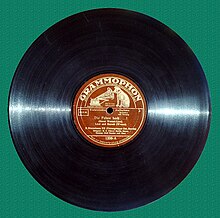Horst Wessel Song
| "Horst-Wessel-Lied" | ||
|---|---|---|

"Horst-Wessel-Lied" cover
|
||
| Song | ||
| Released | 1929 | |
| Genre | Marching music/party anthem | |
| Writer(s) | Horst Wessel | |
|
"The Horst Wessel Song" (instrumental) |
||
"Horst-Wessel-Lied" (English: "The Horst Wessel Song"; pronounced [hɔʁst ˈvɛsl̩ liːt]), also known by its opening words, "Die Fahne hoch" ("The Flag on High"), was the anthem of the Nazi Party from 1930 to 1945. From 1933 to 1945 the Nazis made it a co-national anthem of Germany, along with the first stanza of the "Deutschlandlied".
The lyrics to "Horst-Wessel-Lied" were written in 1929 by Sturmführer Horst Wessel, the commander of the Nazi paramilitary "Brownshirts" (Sturmabteilung or "SA") in the Friedrichshain district of Berlin. Wessel wrote songs for the SA in conscious imitation of the Communist paramilitary, the Red Front Fighters' League, to provoke them into attacking his troops, and to keep up the spirits of his men.
Wessel – the son of a pastor, with a university education but employed as a construction worker – became well-known among the Communists when – on orders from Joseph Goebbels, the Nazi Gauleiter (regional party leader) of Berlin – he led a number of SA incursions into the Fischerkiez, an extremely poor Berlin district where Communists mingled with underworld figures. Several of these agitations were only minor altercations, but one took place outside the tavern which the local German Communist Party (KPD) used as its headquarters. As a result of that melee, five Communists were injured, four of them seriously. The Communist newspaper accused the police of letting the Nazis get away, while arresting the injured Communists, while the Nazi newspaper claimed that Wessel had been trying to give a speech when shadowy figures emerged and began the fight. Wessel was marked for death, with his face and address featured on Communist street posters, and the slogan of the KPD and the Red Front Fighters' League became "Strike the fascists wherever you find them."
...
Wikipedia
